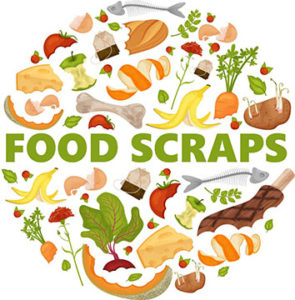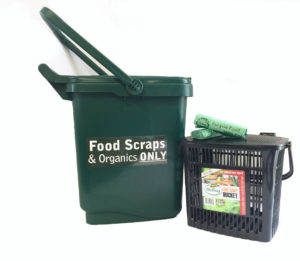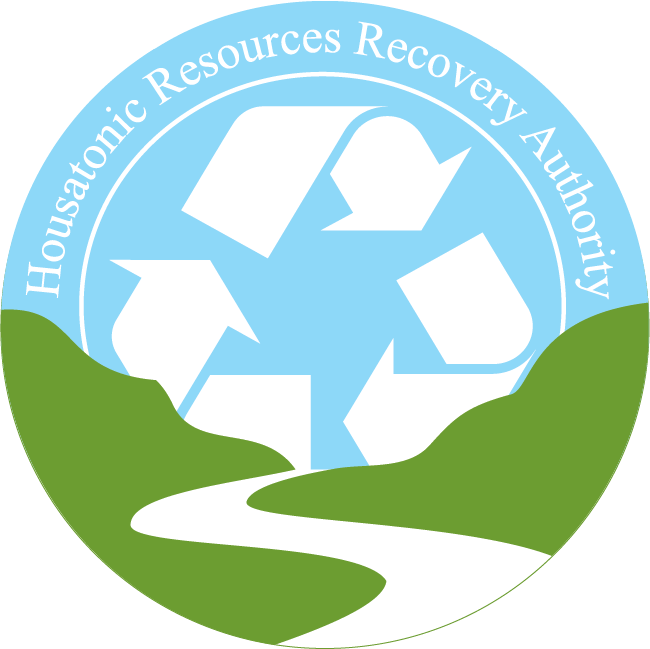Separating organic materials from the trash should be thought of as a resource, not a waste. In Connecticut, food scraps make up about one of every five pounds of garbage, according to a 2015 study published by the state Department of Energy and Environmental Protection. More food reaches landfills and incinerators than any other single material in our everyday trash. Composting reduces the waste going to out of state landfills but can also reduce your household garbage. Compost added to gardens, construction sites, and poor soils makes great things happen!
We hope that you will consider joining us in the effort to prevent food waste from entering the conventional waste stream and promote a sustainable environment!

For active participants of the Redding Food Scraps Recycling Program compost is available on Saturday, May 17th.
Bring your 5 or 6 gallon container and check in with the Transfer Station attendant first.
Want to join the program?
Are you interested in separating your food scraps from your trash so it can be made into compost, but don’t want to do it in your back yard? Here’s everything you need to know to participate in the Redding food scraps recycling program. Click on the topics below for more information.
How does the program work and what does it cost?
The cost to dispose of organics is.10 cents per pound. That’s 60 % less than the cost to dispose of regular household garbage which is .25 cents a pound. You must also have an annual transfer station permit as a PERMIT IS REQUIRED to participate. Click here to print the Town of Redding transfer station permit application.
It is very important that participants bring ONLY acceptable items. The full list of acceptable items is in the next drop-down menu.
Participants simply dump their own container out into a designated collection bin at the TRANSFER STATION located at 84 Hopewell Woods Rd West, Redding.
IMPORTANT – Please DO NOT contaminate the compost. Remove plastic ties, stickers, twist ties and DO NOT use plastic bags. It’s important to note that contaminated material cannot be processed into compost. It will be disposed of as MSW (Municipal Solid Waste aka trash) and sent to a waste-to-energy plant, which adds cost to the program.
Please take notice that the material you drop off may be examined for contamination by the transfer station attendant. If the attendant believes you are repeatedly violating the rules of acceptable material, you risk being banned from the program. The success of the program is dependent on participants being mindful and bringing only acceptable material.
Compost will be available to residents in the spring. More information will be posted on this website.
Acceptable waste items
REMEMBER – ONLY the items listed below are allowed in your bin.
No PLASTIC items, stickers, rubber bands or twist ties!
- Houseplants & Flower Bouquets
- Flower & Vegetable Garden Clippings
- Fruits & Nuts (including pits)
- Vegetables ***Remove stickers, bands and ties***
- Bread, Pasta & Grains
- Sauces, Soup & Gravy
- Coffee Grounds & Filters
- Tea Bags
- Egg Shells
- Meats & Poultry (including bones)
- Dairy Products
- Fish & Shellfish
- Plate Scrapings
- Spoiled food
- Fridge leftovers
Can I add items that say "compostable"?
For the success of our program we are asking residents to stick to our published list of acceptable items (see below). Even though companies can label and market their products as “compostable” or “compostable in a commercial facility” they may not actually be compostable or accepted by the composting facility. For these reasons and more, please leave them out of the program.
Collection Container

You may collect your food scraps and organic waste in your own bucket such as a 5-gallon pail, Or you may purchase a collection kit directly from the from HRRA for $20. The collection kit consists of a 1.5 gallon kitchen bin, 1 roll of compostable bags (25 bags total) and a 6-gallon Eco-Caddy with lock lid. You can purchase and pick up your collection kit at the Redding Highway Dept., located at 28 Great Oak Ln., Redding once you receive a confirmation email.
CLICK HERE and fill out the online order form.
What is the Redding Food Scraps Recycling Program?
The Town of Redding is providing residents the opportunity to reduce their waste and recycle their food scraps through this food scraps recycling program located at the town’s recycling center.
Why should I compost?
The study found that composting organic waste versus landfilling it can reduce more than 50% of carbon dioxide-equivalent greenhouse gas emissions, for a total of 2.1 gigatons between now (2020) and 2050 if climate change is curbed to a 2 degree Celsius rise in the average global temperature. However the emission savings from landfill diversion is only one benefit of composting. Click Here to read more about the study
Separating your food scraps for compost is easy and provides many benefits, some of which are listed below:
- Since food waste on average makes up 24% of the waste stream and is often the heaviest material in your trash, reducing the weight by composting will also save you money.
- Compost is beneficial to the environment. It is a unique soil amendment because of its ability to hold moisture and soluble minerals.
Composted organics are beneficial, because they:
-
- Maximize plant growth.
- Effective at preventing soil erosion.
- Aid in Stream and land reclamation.
- Reconstruction of wetlands.
- Help with storm water management.
- Reduces the need for fertilizers.
- Reduces the need for pesticides.
- Improves the over all health of soil.
Resources
Using compostable bags
The compostable bags provided are for your convenience and are meant to help eliminate the yuck factor. You do not have to use the compostable bags and we welcome individuals who wish to use just their containers to collect waste.
If you do choose to use compostable bags, you are required to use only bags approved by the program. At this time Biobags are the only approved and certified compostable bags we will accept. If you wish to purchase your own supply you can find them online from many retailers.
PLEASE NOTE, compostable bags are meant to break down. They do have a shelf life. We do not recommend buying in bulk unless you are planning to share and or use them within their recommended shelf life which is approximately one year.
